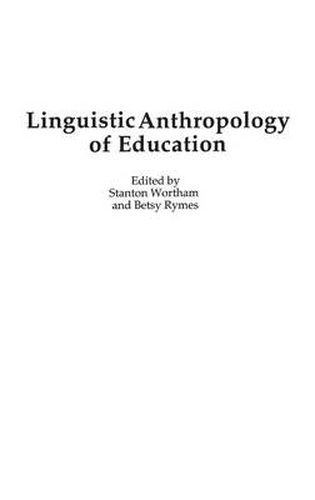Readings Newsletter
Become a Readings Member to make your shopping experience even easier.
Sign in or sign up for free!
You’re not far away from qualifying for FREE standard shipping within Australia
You’ve qualified for FREE standard shipping within Australia
The cart is loading…






Over the years, linguistic anthropological research has shown how classrooms are socializing institutions and how language functions as one medium through which this socialization is accomplished. Early work in the field has captured the immediacy of social practice and language use in educational contexts, and has created useful characterizations of variations in communicative competence.
The present work builds on the strengths of prior work, showing how new theoretical concepts and empirical methods developed in linguistic anthropology over the last decade can further illuminate educational settings. The authors introduce an updated Linguistic Anthropology of Education which recognizes that, in the rapidly changing field of cultural production within which children and teachers operate today, the exploration of multiple, pre-existing forms of communicative competence is not enough. This volume elaborates theory and illustrates the tools and practices of the Linguistic Anthropology of Education to account for today’s research context in which the multiplicity of identity, and the multiple ways language can be used to represent it, have important ramifications for how learning and social reproduction emerge within educational contexts.
$9.00 standard shipping within Australia
FREE standard shipping within Australia for orders over $100.00
Express & International shipping calculated at checkout
Over the years, linguistic anthropological research has shown how classrooms are socializing institutions and how language functions as one medium through which this socialization is accomplished. Early work in the field has captured the immediacy of social practice and language use in educational contexts, and has created useful characterizations of variations in communicative competence.
The present work builds on the strengths of prior work, showing how new theoretical concepts and empirical methods developed in linguistic anthropology over the last decade can further illuminate educational settings. The authors introduce an updated Linguistic Anthropology of Education which recognizes that, in the rapidly changing field of cultural production within which children and teachers operate today, the exploration of multiple, pre-existing forms of communicative competence is not enough. This volume elaborates theory and illustrates the tools and practices of the Linguistic Anthropology of Education to account for today’s research context in which the multiplicity of identity, and the multiple ways language can be used to represent it, have important ramifications for how learning and social reproduction emerge within educational contexts.